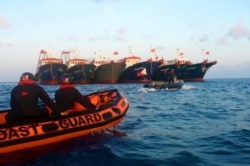The Philippine government took another step this month in opposing China by telling its vast fishing fleet to ignore Beijing’s annual fishing ban in the South China Sea, where the two countries are locked in a sovereignty dispute.
This year’s fishing moratorium “does not apply to our fishermen,” the Philippines’ South China Sea task force said on May 4, as reported by domestic media. Officials have “encouraged” fishing boats to trawl the sea, news website Philstar.com reported.
China’s moratorium from May 1 to August 16, imposed unilaterally since 1999 in the northern part of the sea, is intended to improve marine ecology, the official Xinhua News Agency in Beijing said last month. More than 50,000 Chinese vessels would suspend operations, it said.
Growing anti-China sentiment
Mounting public pressure against China in the Philippines prompted the government to reject the moratorium publicly, a potential boon to a domestic fishing industry that employs some 2 million people, experts say.
Philippine President Rodrigo Duterte forged a new friendship with China in 2016 by laying aside the sovereignty dispute, but Chinese vessels continue to appear in waters claimed by Manila. Duterte’s political allies, who plan to seek office next year after he steps down due to term limits, are expected to follow public opinion on China.
“There’s a lot of political heat, so the Philippine government cannot be seen to be acquiescing to Chinese pressure,” said Eduardo Araral, associate professor at the National University of Singapore's public policy school.
Fishing vessel operators want the government to take a “much stronger posture” toward the South China Sea, said Jay Batongbacal, international maritime affairs professor at the University of the Philippines in Quezon City. They complain they seldom see their own country’s navy or coast guard, he said. Four Philippine Navy ships set off this week to support fishing vessels in the Spratly Islands.
“Because of the more intense public pressure, they’re responding by sending ships to show some visibility and also encouraging the fishermen to fish,” Batongbacal said.
China claims about 90% of the 3.5 million-square-kilometer sea that’s prized for fisheries and fossil fuel reserves. It’s the most militarily advanced of the six governments that dispute sovereignty over the sea. Brunei, Malaysia, Taiwan and Vietnam call all or parts of the South China Sea their own, as well. Claimants prize the waterway for its fishing stocks and fossil fuel reserves.
The moratorium zone covers waters used by Taiwan and Malaysia as well as the Philippines.
Thinning relationship
Duterte visited Beijing in 2016 to set aside the sovereignty issue. China then pledged $24 billion in aid and investment for the developing Southeast Asian country. But Duterte has angered Filipinos since that visit by saying China was too strong at sea for the Philippines to resist.
Officials in Manila said little about previous Chinese fishing bans. Philippine fishing boats know where it's safe and unsafe after so many years of bans, Araral said.
China has stoked public hostility by letting hundreds of its fishing vessels pass at least twice near Philippine-controlled islets in the disputed sea. A flotilla that peaked at 220 vessels moored at Whitsun Reef in the sea’s Spratly Islands in March. Philippine officials demanded that those vessels leave the unoccupied feature.
Filipinos had never regarded China as a friend before 2016, allying instead with the United States militarily since the 1950s. Officials in Manila aim now to retain their Visiting Forces Agreement with Washington this year, even though Duterte had once vowed to scrap it.
“For Duterte, this is an opportunity to demonstrate that he is keen to resist China in the way he deems fit,” said Collin Koh, maritime security research fellow at Nanyang Technological University in Singapore.
China expected to be low key
China has not publicly rebutted the Philippine government for urging fishing boats to ignore the moratorium. It will probably just ask that any boats leave the no-fishing zone rather than impounding them, lest Philippine officials get even angrier, Araral said.
A frayed Sino-Philippine relationship risks pushing Manila closer to Washington. Beijing resents U.S. presence in the South China Sea, although the U.S. has no territorial claims there.
China might tell its fishing boats to leave Whitsun Reef as well as letting Philippine fishermen fish in the moratorium zone, said Aaron Rabena, research fellow at the Asia-Pacific Pathways to Progress Foundation in Metro Manila
“There can be relative stability if the fishing vessels withdraw and they don’t enforce that fishing ban on us,” he said.






